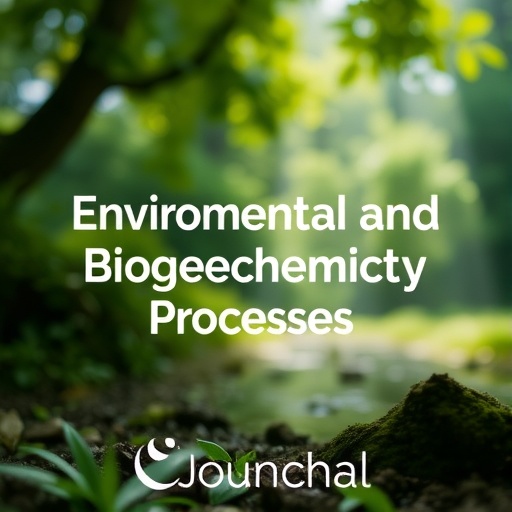In a significant advancement for environmental sciences, the launch of a groundbreaking, open-access journal titled Environmental and Biogeochemical Processes promises to deepen our understanding of the intricate interactions that govern Earth’s biological, geological, and chemical frameworks. This pioneering publication is positioned to become an essential platform for researchers dedicated to elucidating critical mechanisms that influence the sustainability and resilience of our planet’s ecosystems. By fostering interdisciplinary collaboration, the journal aims to catalyze innovative research that bridges the gaps between distinct but intimately related Earth system components.
This new journal focuses on the dynamic biogeochemical processes occurring across soils, sediments, and aquatic environments, recognizing their fundamental role in regulating elemental cycles and sustaining biodiversity. The intricate pathways through which nutrients and contaminants flow, transform, and cycle within and between these media are critical to understanding the health and productivity of terrestrial and marine systems. Researchers contributing to the journal will advance knowledge in tracing these pathways, revealing how biogeochemical interactions impact global environmental quality and ecosystem services.
Another core theme of the journal is the exploration of atmosphere-biosphere-geosphere interactions. These overlapping spheres represent a nexus where biological activities intersect with physical and chemical processes, driving the exchange of gases, energy, and materials that regulate climate systems and biotic communities. Investigations into this interface are essential for predicting responses to environmental perturbations such as land-use change, pollution inputs, and natural disasters. The journal endeavors to publish cutting-edge studies that dissect these complex feedback loops through novel monitoring techniques and integrative modeling approaches.
Climate change and anthropogenic pressures impose unprecedented stress on Earth’s ecological and geochemical systems. The journal emphasizes research into Earth system resilience, particularly how natural and human-altered processes influence the capacity of ecosystems to absorb, adapt to, and recover from disturbances. This resilience is a cornerstone to maintaining vital ecosystem functions such as carbon sequestration, nutrient cycling, and habitat provision. Contributions detailing mechanistic insights into resilience factors will be instrumental in informing adaptive management and policy frameworks.
Pollution mitigation strategies grounded in biogeochemical innovation represent a transformative avenue for environmental remediation. The journal actively encourages submissions that detail novel methods to harness natural processes—such as microbial metabolism, mineral transformations, or plant uptake—to detoxify or immobilize contaminants. Such approaches are critically important for addressing persistent pollutants, heavy metals, and emerging contaminants that jeopardize environmental and human health globally. The integration of engineered and nature-based solutions will be a recurring emphasis in published studies.
Human activities have increasingly altered elemental cycles, notably carbon, nitrogen, phosphorus, and sulfur, often leading to ecosystem degradation and climate feedbacks. The journal aims to dissect these human-driven changes by examining the sources, pathways, and fates of altered elemental fluxes within the environment. Researchers equipped with isotopic tracing, geochemical modeling, and field-based experiments will find a welcoming forum to present their findings on how urbanization, agriculture, and industrial activities restructure biogeochemical networks.
Envisioning a holistic approach, Environmental and Biogeochemical Processes advocates for integrative methodologies that combine multi-disciplinary data streams, from molecular biology and geochemistry to remote sensing and computational simulations. By merging scales of observation—from microscopic interactions to global trends—researchers can unravel the multilayered complexity of environmental systems. The journal’s mission underlines the critical need for cross-sector collaboration to design sustainable solutions for environmental challenges of the 21st century.
An exciting aspect heralding the journal’s commitment to open scientific dialogue is its full waiver of article processing charges from 2025 through 2027. This initiative removes financial barriers for authors worldwide, accelerating the dissemination of vital research findings and fostering inclusivity across global scientific communities. By facilitating access without economic constraints, the journal aims to democratize knowledge exchange and amplify the impact of cutting-edge discoveries.
Researchers interested in submitting their work can access the journal’s submission portal, which is now fully operational. The editorial board actively seeks high-caliber manuscripts that align with the journal’s thematic focuses, welcoming experimental studies, theoretical analyses, review articles, and perspectives that push the boundaries of environmental biogeochemistry. Prospective authors are encouraged to contribute to topics ranging from pollution remediation and ecosystem restoration to sustainable resource management and the mitigation of climate change impacts.
Spearheading the journal’s inaugural issue is an editorial that sets the stage for future scientific discourse. This foundational piece synthesizes existing knowledge while laying out the pressing questions and emergent trends that will guide forthcoming research efforts. Readers and contributors alike can benefit from this synthesis, which provides a roadmap for advancing the field through interdisciplinary collaboration and innovative experimental design.
Environmental scientists, policy makers, and the broader public stand to gain immensely from the journal’s content. By offering robust, peer-reviewed research and fostering dialogue around the mechanisms underpinning Earth’s biogeochemical cycles, the journal supports evidence-based decision-making. In doing so, it contributes meaningfully to global efforts aimed at achieving sustainability and mitigating anthropogenic impacts on our planet’s delicate systems.
The launching of Environmental and Biogeochemical Processes arrives at a critical juncture as the world confronts escalating environmental crises. Through fostering cutting-edge research and promoting open access to scientific insights, the journal is poised to influence not only academic discourse but also practical environmental management and policy strategies. It embodies hope for a future where interdisciplinary science drives the restoration and preservation of Earth’s life-support systems.
Finally, the editorial team behind the journal comprises leading experts across multiple disciplines, ensuring that each published work meets rigorous scientific standards while addressing real-world environmental challenges. This dedication to quality and relevance positions the journal as an indispensable resource for scholars and practitioners committed to understanding and protecting our planet’s interconnected systems.
Subject of Research: Not applicable
Article Title: Environmental and Biogeochemical Processes
News Publication Date: 13-Aug-2025
Web References: https://www.maxapress.com/article/doi/10.48130/ebp-0025-0001
Image Credits: Bo Pan, Yandi Hu, Dong Zhu, Patryk Oleszczuk, Alexander E. S. Van Driessche, Tong Zhang, Zulin Zhang, Xueyan Liu, Songhu Yuan, Willie Peijnenburg, Baoshan Xing & Jason C. White
Keywords: Climate change; Human health; Environmental remediation




